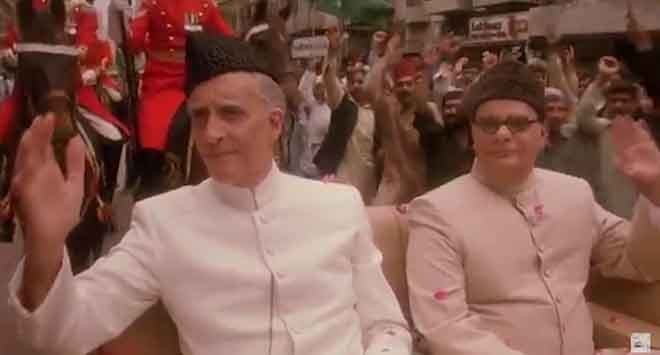
More than twenty years later, actor Shakeel reminisces about the interesting anecdotes, controversies and pressures that went into the making of Jinnah

"Few individuals significantly alter the course of history. Fewer still modify the map of the world. Hardly anyone can be credited with creating a nation-state. Mohammad Ali Jinnah did all three." That is how the monumental homage to the Founder of Pakistan, the film Jinnah, opens. Helmed and co-written by Jamil Dehlavi and Akbar S. Ahmed, the biopic released in 1998, celebrated its 20th anniversary recently.
Though the film was meant to have been a tribute (patriotic propaganda if you will) to the struggles and triumph of the country’s first Governor General, it generated controversy even before its principal photography began. The casting of knighted British actor, Christopher Lee (late) and Indian actor, Shashi Kapoor (late) in a pivotal part as the narrator, was denounced collectively. That partition led to violence and it was something that Jinnah regretted was a message that added fuel to fire.
Veteran actor and recipient of the Pride of Performance award, Shakeel Yousaf, played Pakistan’s first Prime Minister, Liaquat Ali Khan in an extended cameo. He recalls the gruelling process of being cast for the part. He was first approached for the role through his agent, Punit, in London, amongst several other actors from Pakistan, UK and India. He was then asked to audio-record a few lines from an excerpt of the script, followed by another audition of sorts that also required him to send across a video-recording, before finally coming on board.
"After I was selected, they sent all my measurements to London, to prepare the wardrobe for the part," Shakeel narrated. "But the sherwani was stitched here, in Karachi, albeit under their close supervision.
"There was a problem when I had to wear lenses [Shakeel has light-coloured eyes]. It wasn’t possible to get cosmetic lenses off the rack in the UK without the doctor’s prescription. It was a hassle, and we finally got hold of someone who agreed to get us two pairs of dark brown lenses from Dubai."
Along with objections on the other members of the cast Shakeel’s selection was also found disagreeable. "They (the makers) felt I had no resemblance whatsoever to Liaquat sahab. However, once the pictures were taken, with the entire costume, I was astounded by the similarity," he remembers. "Jamil and Akbar sahab were both satisfied, but Liaquat sahab’s two sons didn’t approve much of me. The pictures hadn’t been released, so they didn’t know how I looked in-character."
Mostly shot at actual locations, Shakeel and Christopher filmed one of the most impactful scenes in an airplane from Bombay to Karachi, where Jinnah, seated across, taking a sigh of relief yet sorrow, requested Khan to take oath. Moreover, in the scene depicting Quaid and Liaquat roaming through Karachi on a horse-drawn carriage, greeted by enthusiastic patriots, enormous amount of arrangements were made to document the historic parade. 8,000 extras were recruited, including the rangers and the police present to ensure safety, all of whom were made to don traditional kurta-pyjamas and topees (caps).
"The whole area was cordoned off and seats were placed at the footpaths for VIPs, who were invited to watch the shooting," Shakeel reminisces about one of the final days on set. "And among them were Liaquat sahab’s son, Akbar Bhai. When he saw me sitting besides Christopher, in the horse-cart, he walked up to me, crossed the barrier and I stood up. I could see emotions in his eyes. We shook hands; he hugged me and apologised because he thought I looked a lot like his father. Coming from him, it meant a great deal to me. Even when Dina (Wadia) came to Pakistan after the shoot, she approved of Christopher cast as her father."
Not only was there clamour on the outside, but there was tension on-set as well. Shashi Kapoor, in an interview, had regretted his decision of travelling to this side of the border, whereas Dehlavi and Lee’s publicly known spat had also taken the better of the project. Shakeel, however, shared great camaraderie with the late British actor. He revealed that even though he desired to meet Lee before the film went on-floor, it was actually at the Sindh Club that the two met on the first day of recording and later went together to Pearl Continental, where the crew from London stayed and the makeup-room had been laid out.
"As I walked up to Christopher (on the set), he asked me how I was and, within no time, he made me completely comfortable. We got talking about the quail cooking there, the ambience, which he felt was a lot like back home. Later, I was told that he had inquired about me and was briefed about my career in Pakistan," Shakeel observed. "Working with Christopher was a treat, especially with the reservations that the team had otherwise."
"Prior to this film, very many half-baked attempts were made to make a film on the Quaid. In fact, there was another film before this that I was supposed to be a part of, started by late Aftab Ahmed of PTV, in collaboration with an Arab production company. But it got shelved. There was another American gentleman, Professor Robert Todd, who met at a function in the US. He was a die-hard fan of Quaid, and after retirement wanted to document his life," revealed Shakeel, on a parting note. "Even with Jinnah, there was a lot of pressure on the writer, to show one aspect and not the other, there was criticism coming from left, right and centre, there were financial problems as well, a lot of fundraisers were arranged, but at last, it was just made with a lot of heart."